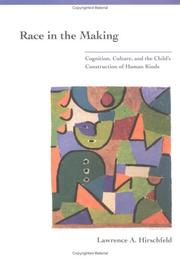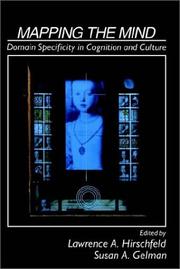| Listing 1 - 3 of 3 |
Sort by
|

ISBN: 0262082470 0262581728 0262275414 0585003092 9780262275415 9780585003092 9780262082471 9780262581721 Year: 1996 Publisher: Cambridge, Mass. ; London, England : MIT Press,
Abstract | Keywords | Export | Availability | Bookmark
 Loading...
Loading...Choose an application
- Reference Manager
- EndNote
- RefWorks (Direct export to RefWorks)
Race in the Making provides a new understanding of how people conceptualize social categories and shows why this knowledge is so readily recruited to create and maintain systems of unequal power. Hirschfeld argues that knowledge of race is not derived from observations of physical difference nor does it develop in the same way as knowledge of other social categories. Instead, his central claim is that racial thinking is the product of a special-purpose cognitive competence for understanding and representing human kinds. The book also challenges the conventional wisdom that race is purely a social construction by demonstrating that a common set of abstract principles underlies all systems of racial thinking, whatever other historical and cultural specificities may be associated with them. Starting from the commonplace observation that race is a category of both power and the mind, Race in the Making directly tackles this issue. Through a sustained exploration of continuity and change in the child's notion of race and across historical variations in the race concept, Hirschfeld shows that a singular commonsense theory about human kinds constrains the way racial thinking changes, whether in historical time or during childhood. After surveying the literature on the development of a cultural psychology of race, Hirschfeld presents original studies that examine children's (and occasionally adults') representations of race. He sketches how a jointly cultural and psychological approach to race might proceed, showing how this approach yields new insights into the emergence and elaboration of racial thinking
Cognition and culture. --- Racism. --- Ethnopsychology. --- Cognition in children. --- Child psychology. --- Prejudices in children. --- Cognition et culture --- Racisme --- Ethnopsychologie --- Cognition chez l'enfant --- Enfants --- Préjugés chez l'enfant --- Psychologie --- Cognition and culture --- Racism --- Ethnopsychology --- Cognition in children --- Child psychology --- Prejudices in children --- Culture --- Psychology, Social --- Age Groups --- Population Groups --- Thinking --- Mental Processes --- Persons --- Anthropology, Cultural --- Psychological Phenomena and Processes --- Behavior and Behavior Mechanisms --- Sociology --- Named Groups --- Social Sciences --- Anthropology --- Psychiatry and Psychology --- Anthropology, Education, Sociology and Social Phenomena --- Cross-Cultural Comparison --- Infant --- Prejudice --- Cognition --- Continental Population Groups --- Concept Formation --- Child --- Psychology --- Bias, Racial --- Race bias --- Race prejudice --- Racial bias --- Prejudices --- Anti-racism --- Race relations --- Prejudices and antipathies (Child psychology) --- Cross-cultural psychology --- Ethnic groups --- Ethnic psychology --- Folk-psychology --- Indigenous peoples --- National psychology --- Psychological anthropology --- Psychology, Cross-cultural --- Psychology, Ethnic --- Psychology, National --- Psychology, Racial --- Race psychology --- National characteristics --- Cognition (Child psychology) --- Thought and thinking in children --- Culture and cognition --- Ethnophilosophy --- Socialization --- Behavior, Child --- Child behavior --- Child study --- Children --- Pediatric psychology --- Psychology, Child --- Child development --- Developmental psychology --- Child psychiatry --- Child rearing --- Educational psychology --- Préjugés chez l'enfant --- Concept Formations --- Formation, Concept --- Formations, Concept --- Race --- Racial Stocks --- Continental Population Group --- Group, Continental Population --- Groups, Continental Population --- Population Group, Continental --- Population Groups, Continental --- Races --- Racial Stock --- Stock, Racial --- Stocks, Racial --- Cognitive Function --- Cognitions --- Cognitive Functions --- Function, Cognitive --- Functions, Cognitive --- Infants --- Transcultural Studies --- Comparison, Cross-Cultural --- Comparisons, Cross-Cultural --- Cross Cultural Comparison --- Cross-Cultural Comparisons --- Studies, Transcultural --- Study, Transcultural --- Transcultural Study --- Science, Social --- Sciences, Social --- Social Science --- General Social Development and Population --- Psychologic Processes and Principles --- Cultural Anthropology --- Ethnography --- Ethnographies --- Person --- Human Information Processing --- Information Processing, Human --- Critical Thinking --- Thinking Skills --- Thinking Skill --- Thinking, Critical --- Indigenous Population --- Native-Born --- Natives --- Tribes --- Group, Population --- Groups, Population --- Indigenous Populations --- Native Born --- Population Group --- Population, Indigenous --- Populations, Indigenous --- Age Group --- Group, Age --- Groups, Age --- Social Psychology --- Psychologies, Social --- Social Psychologies --- Beliefs --- Cultural Background --- Customs --- Background, Cultural --- Backgrounds, Cultural --- Belief --- Cultural Backgrounds --- Cultures --- Custom --- Cultural Characteristics --- Minors --- Psychologic Processes --- Psychological Processes --- Phenomena, Psychological --- Processes, Psychologic --- Processes, Psychological --- Psychological Phenomenas --- Psychological Processe --- Qualitative Research --- Thought --- Thoughts --- Race Factors --- Psychology, Perceptual --- Perceptual Psychology --- Anti-Semitism --- Islamophobia --- Anti Semitism --- Anti-Semitisms --- Islamophobias --- Material Culture --- Culture, Material --- Material Cultures --- Cultural Relativism --- Cultural Relativisms --- Relativism, Cultural --- Relativisms, Cultural --- Critical race theory --- Child Psychology

ISBN: 0521429935 0521419662 0511752903 Year: 1994 Publisher: Cambridge : Cambridge University Press,
Abstract | Keywords | Export | Availability | Bookmark
 Loading...
Loading...Choose an application
- Reference Manager
- EndNote
- RefWorks (Direct export to RefWorks)
What is the nature of human thought? A long dominant view holds that the mind is a general problem-solving device that approaches all questions in much the same way. Chomsky's theory of language, which revolutionised linguistics, challenged this claim, contending that children are primed to acquire some skills, like language, in a manner largely independent of their ability to solve other sorts of apparently similar mental problems. In recent years researchers in anthropology, psychology, linguistic and neuroscience have examined whether other mental skills are similarly independent. Many have concluded that much of human thought is 'domain-specific'. Thus, the mind is better viewed as a collection of cognitive abilities specialised to handle specific tasks than a general problem solver. This volume introduces a general audience to a domain-specificity perspective, by compiling a collection of essays exploring how several of these cognitive abilities are organised.
psychologie --- cognitieve psychologie --- domeinspecificiteit --- 159.9 --- 303 --- 303 Methoden bij sociaalwetenschappelijk onderzoek --- Methoden bij sociaalwetenschappelijk onderzoek --- Health Sciences --- Psychiatry & Psychology --- Cognition and culture --- Human information processing --- Schemas (Psychology) --- Psychological schemas --- Schemata (Cognition) --- Schemata (Psychology) --- Scripts (Psychology) --- Cognition --- Information processing, Human --- Bionics --- Information theory in psychology --- Perception --- Culture and cognition --- Culture --- Ethnophilosophy --- Ethnopsychology --- Socialization --- Cognitive psychology --- Human information processing. --- Cognition and culture. --- Mental models --- Models, Mental
Book
Year: 1994 Publisher: Cambridge : Cambridge university press,
Abstract | Keywords | Export | Availability | Bookmark
 Loading...
Loading...Choose an application
- Reference Manager
- EndNote
- RefWorks (Direct export to RefWorks)
| Listing 1 - 3 of 3 |
Sort by
|

 Search
Search Feedback
Feedback About UniCat
About UniCat  Help
Help News
News